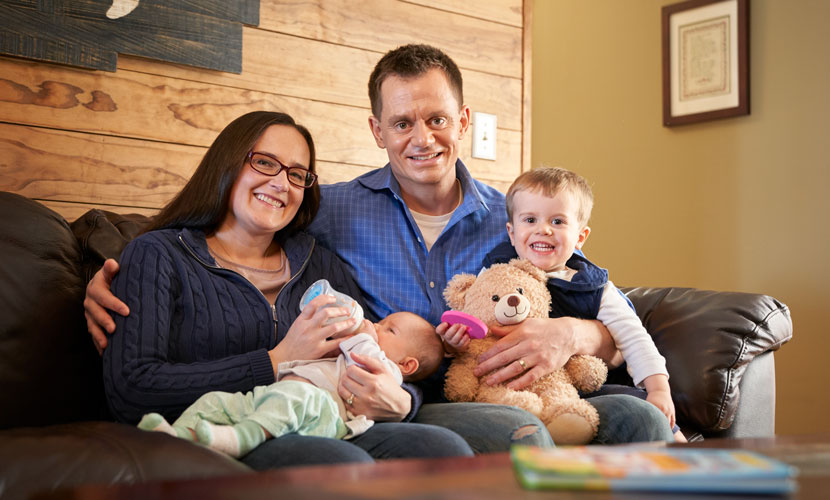Up until the last week of pregnancy, Melissa Jensen had been perfectly healthy. Then suddenly one day, her baby’s heartbeat couldn’t be found. “Her scenario is, unfortunately, too common,” says Sue Steen, Perinatal Nurse Navigator at Maple Grove Hospital. “You may be very healthy and have a healthy baby, then, sometimes even close to term, you don’t feel your baby move. It’s incomprehensible.”
It’s families like the Jensens’ that Steen and her team support as part of the Perinatal Bereavement Program, an offering of Maple Grove Hospital’s Family Birth Center. Steen started the program six years ago and now leads the core team of four that is supported by a team of 20 to 25 nurses specifically trained and educated for this work. Having an organized program and team of that size with that knowledge set is a rarity, as is the comprehensive offerings they deliver for families dealing with the loss of a baby or those families having another baby after loss.
“There are very few places with the support options we have,” says Steen. “Our goal is to have the experience be the best it can possibly be, helping families celebrate their baby in a way that works for them while having as few regrets as possible.” That support spans through the entirety of the family’s journey. The hospital team calls every customer who experiences a loss, whether that happens in the Family Birth Center or another area of the hospital. And, when they can, the team is there in person to meet the family when they get the news, offering care and resources in whatever way the family needs.
“We’ve found that it is a very important thing for families experiencing loss, to feel like they’re not alone,” says Steen. “If you don’t help parents process the news, take back some control, understand the decisions they need to make and how they want to say goodbye — it can be very challenging for them to emotionally continue on with life.” For the Jensen’s, that immediate connection made all the difference. “We didn’t anticipate anything like this would ever happen and were both completely in shock,” says Melissa. “Had we not had the team there encouraging us to take some time, we would have induced immediately.” “We didn’t know what to do. Sue and the nursing team stepped in and helped us make decisions that mattered a lot to us down the road,” adds Chris Jensen, Melissa’s husband. A nurse checks in with the family either the night they receive the news or the next day. The family can then have their questions answered, as well as discuss all the options for the birthing process, memory-making, and commemoration.
“Every family is different and wants different things,” says Steen. “We offer everything to everyone but use our gut instincts. We support families as they make decisions at their own pace.” The program includes help with birth planning and testing options, as well as memory-making opportunities. The family is able to spend as much time with their baby as they like, have a baptism or blessing, as well as commemorate their baby with mementos like photographs, footprints and molds.
The Jensen’s chose to spend two days with their daughter, Carolyne, during which they read stories, listened to music and had family come to visit her. The team worked to make the Jensen’s room feel like a place of love and healing, inserting personal touches like the soft Kleenex that Melissa prefers, the grape juice she loves and hanging up butterflies, a symbol of Chris’ sister, who he’d lost to cancer. And, immediately after Carolyne was born, the nurses embraced her. “When the nurses came into the room, they went right to Carolyne, just like they would any other living baby,” says Melissa. “They picked her up and talked about how beautiful she was before they came to me, which was really amazing.”
When families are ready to leave the hospital, the team offers the parents ideas on how they can say goodbye, as they know this can be a difficult time. The hospital also holds an annual memorial service that all families who have experienced loss are invited to attend. The Jensen’s took advantage of the option to leave with a stuffed bear, which is made to be the size and weight of a baby. “Leaving a maternity ward without a baby is something that’s impossible to describe,” says Melissa. “It may seem silly to those who don’t understand, but having a weighted bear to bring home and carry out of the hospital was an amazing thing.”
The team recognizes that ongoing and follow-up support is a critical part of the grieving process, which is why they offer assistance long after families leave the hospital, including an in-person, face-to-face group, mom-to-mom and couple-to-couple support, as well as referrals to counselors who focus on perinatal bereavement. “The support we’ve received from the nursing staff has continued to this day,” says Melissa. “They’re like family to us.”
When the Jensen’s had their next two children, Ellis and Isabella, they knew there was nowhere else they’d go. “There are quite a few hospitals closer, but there was no doubt in my mind that Maple Grove Hospital was the only place I’d deliver a child,” says Melissa. Those two pregnancies weren’t easy, but Steen and her team offered support the entire way. They put together the birthing plan Melissa wanted, including arranging for her to be in the same room she was in when giving birth to Carolyne. They were available any time Melissa texted them with questions, and Steen even went with Melissa to some of her scarier doctor’s appointments.
“Of course, it was devastating to lose our daughter,” says Melissa. “But it became something that was amazing and shaped our lives for the better.” They’re like our angels; I don’t know how we would’ve gotten through everything without them.”


